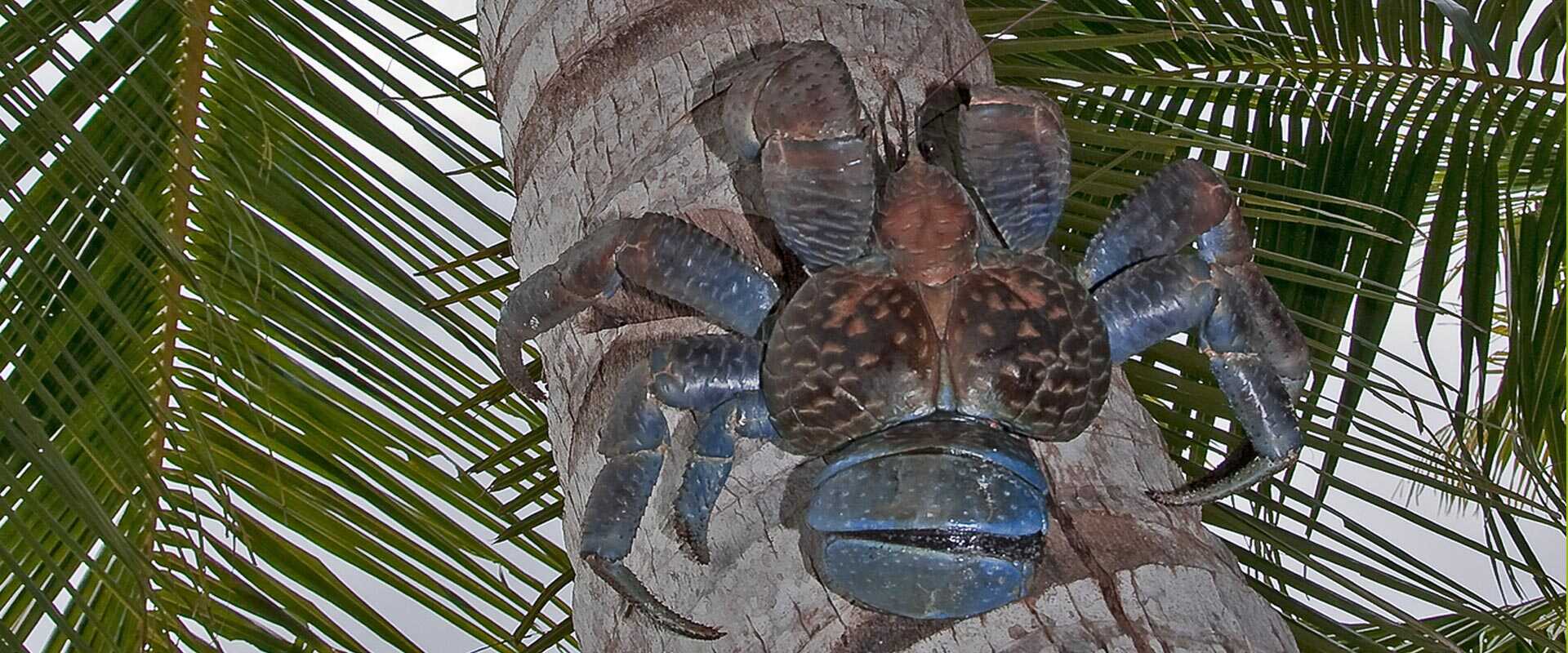West Papua’s Natural Resources Conservation Office Confiscated And Released Hundreds Of Coconut Crab In Fam Islands, Raja Ampat: Reported by: Mohamad Rizki Riadhi* & Maikel Sada** Written by: Nikka Gunadharma***
Stemming from one of the airport porters’ suspicions, on Tuesday night (19th of October, 2021), personnel from Seaport Police Station’s Harbor Security Implementation Unit and Forest Police Unit from the West Papua’s Natural Resources Conservation Office**** followed up the intel, and successfully confiscated 265 coconut crabs (Birgus latro) from the Sorong Harbor, Municipality of Sorong.
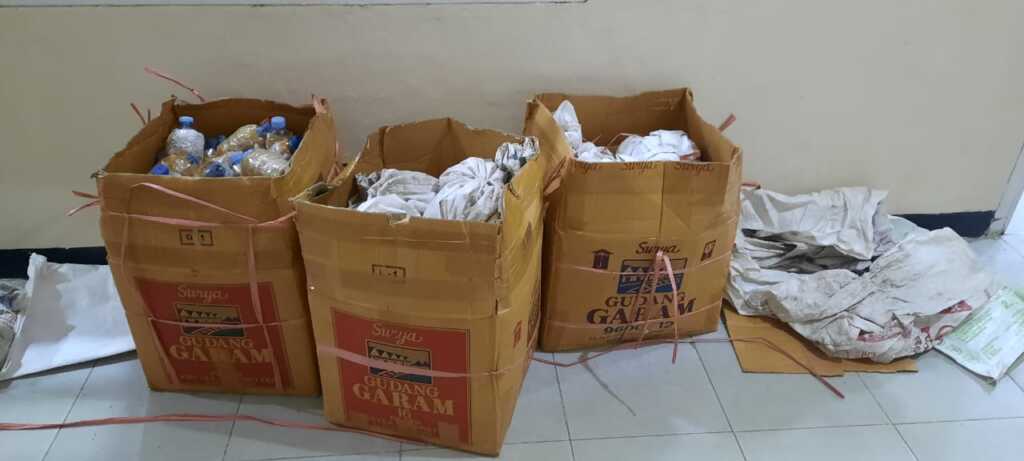
A total of 265 coconut crabs, all of which were stuffed in to three cardboard boxes, were confiscated by personnel from Seaport Police Station’s Harbor Security Implementation Unit and Forest Police Unit from the Office of Conservation of Natural Resources in West Papua on the 19th of October, 2021. (Photo by: Mohamad Rizki Riadhi-Office of Conservation of Natural Resources in West Papua/2021)
There were 139 were juveniles, 72 adolescents, and 54 were adults. Both sender(s) and receiver(s) of the confiscated coconut crabs are still under the investigation from the related law enforcers. However, at this point, it can be confirmed that those coconut crabs were of Raja Ampat origin.
In Indonesia, coconut crabs are one of the faunas protected under the Ministry of Environment and Forestry’s regulations of Number P.20 and P.106 – both were issued in 2018 and, according to Act No. 5 of the Year 1990 on Conservation of Natural Resources and Its Ecosystem, violators can be punished with 5 years of imprisonment and certain amount of fine.
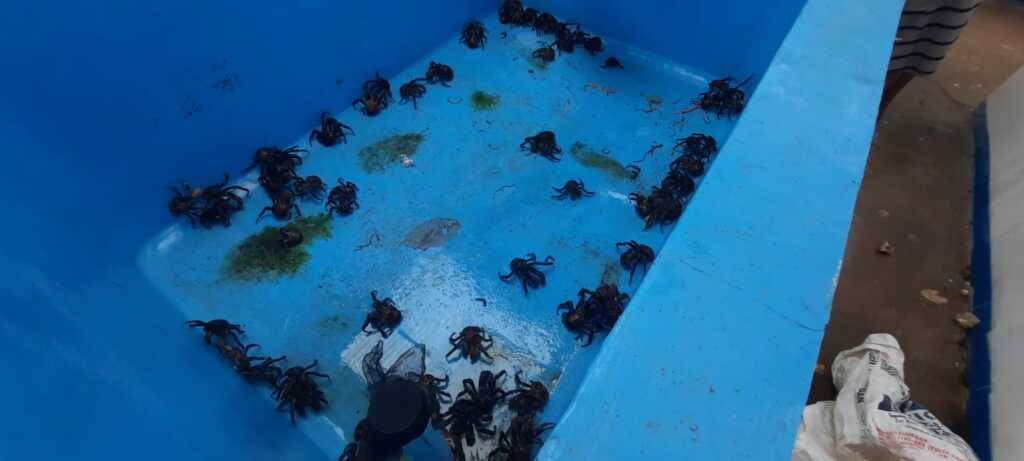
Subsequent to confiscation, all the coconut crabs were ‘deposited’ in the facility owned by the Sorong’s Marine and Fisheries Polytechnic in Maladummes District, Municipality of Sorong. This had to be done to avoid further stress for the coconut crabs. (Photo by: Mohamad Rizki Riadhi-Office of Conservation of Natural Resources in West Papua/2021)
Acting Head of Office of Conservation of Natural Resources in West Papua, Budi Mulyanto, S.Pd., M.Si., revealed that his institution will keep intensifying patrols and surveillance efforts in strategic locations. These efforts cover the managing and processing of information, and utilizing network of related law enforcers, inter-government institutions, and stakeholders.
Following the surveillance efforts, bearing in mind that coconut crabs cannot survive long during transit, the Office of Conservation of Natural Resources in West Papua swiftly involved Raja Ampat’s Marine Park Authority*****, personnel from Seaport Police Station, Fish Quarantine Station Class II Jeffman, Sorong’s Marine and Fisheries Polytechnic, and Conservation International (CI) Indonesia, to release the mentioned coconut crabs in their natural habitats.
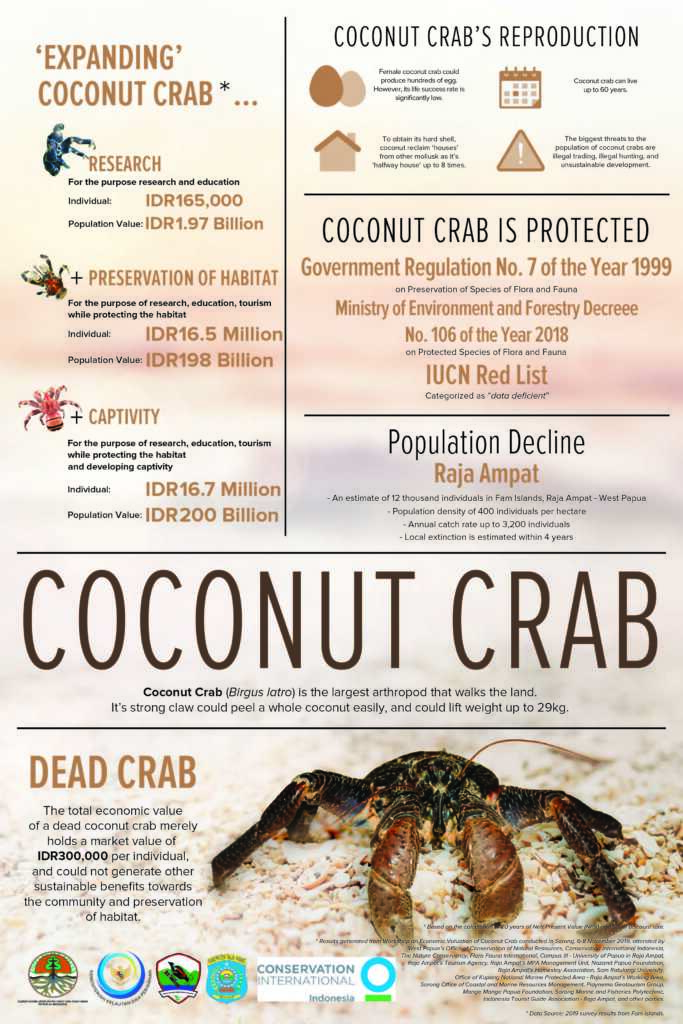
Coconut crab’s conservation poster distributed by the Office of Conservation of Natural Resources in West Papua and CI Indonesia in the three villages in Fam Islands on Saturday, 23rd of October 2021
Acting Head of Office of Conservation of Natural Resources in West Papua continued, “The release is a manifestation of our collective concern on the preservation of coconut crabs, whose population has decreased significantly. We are concerned because there are still individuals whose actions threaten the preservation of protected fauna. We hope, and we encourage, people and all the stakeholders to collaboratively protect those faunas’ sustainability so that one day we can all benefit consistently with the existing laws and regulations.”
The next Saturday, 23rd of October, Office of Conservation of Natural Resources in West Papua and partners consecutively released 212 coconut crabs in Meos Ambower and six more in Saukabu Village, both are located in the Fam Islands, Raja Ampat Regency – and are natural habitats for coconut crabs within the archipelagic regency.
While the remainder of the coconut crabs, as many as 47 individuals, were released on the same day in Mioasaway Islet, one of the islets near Batanta Island, which is a natural habitat for the crabs. The uninhabited islet had previously been prepared as a future reintroduction site by the Office of Conservation of Natural Resources in West Papua and its partners.
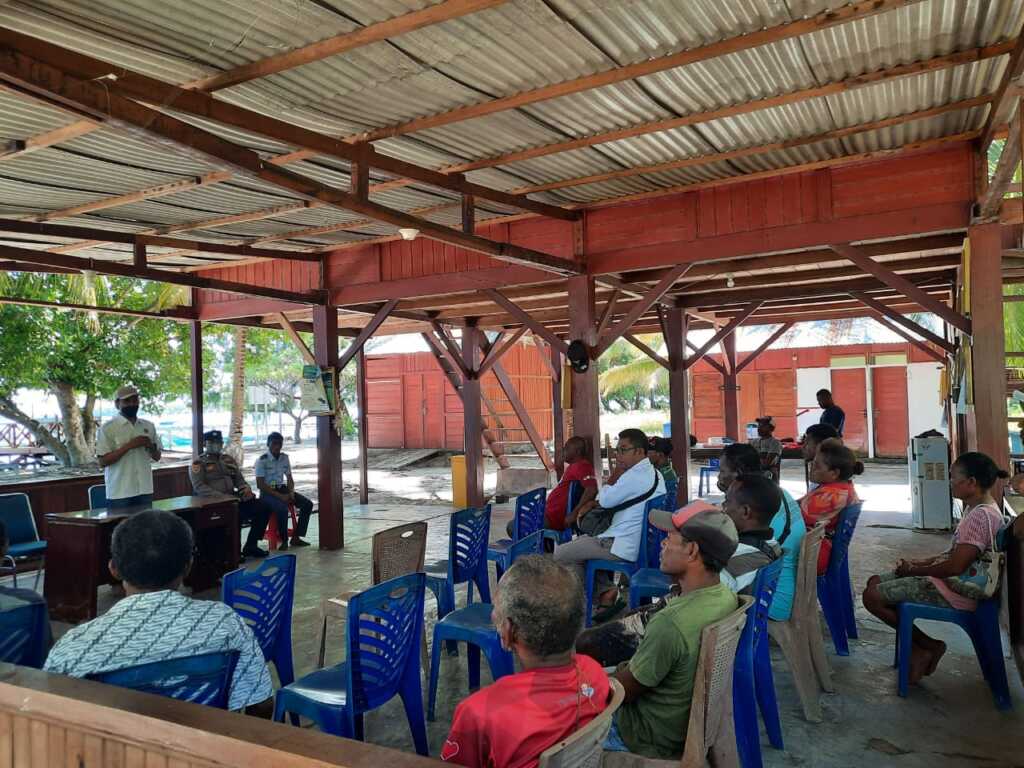
Representative from the Office of Conservation of Natural Resources in West Papua refreshed the memories from members for the Forest Farmers Group, which gathered in Fam Islands Marine Protected Area’s (MPA) Monitoring Post, Meoskor Island. (Photo by: Maikel Sada-CI Indonesia/2021)
For your information, Fam Islands has been dedicated for stewardship by the Office of Conservation of Natural Resources in West Papua through the development of three Forest Farmers’ Group in the three villages there. All three of the groups focus on the development of coconut crabs’ population through development of ecotourism activity.
During a separate interview, Bird’s Head Seascape (BHS) Tourism and Capacity Building Manager from CI Indonesia, Meidiarti Kasmidi, stated, “Locations of the habitat’s preservation for coconut crabs, that are managed by the three Forest Farmers’ Group in Fam Islands, will offer viewing options for the tourists, which include observing coconut crabs in their natural habitat, the way they feed, and information regarding the extraordinary lifecycle of coconut crabs. And since it’s nocturnal, tourists are encouraged to stay overnight in the homestays available in Fam Islands.”
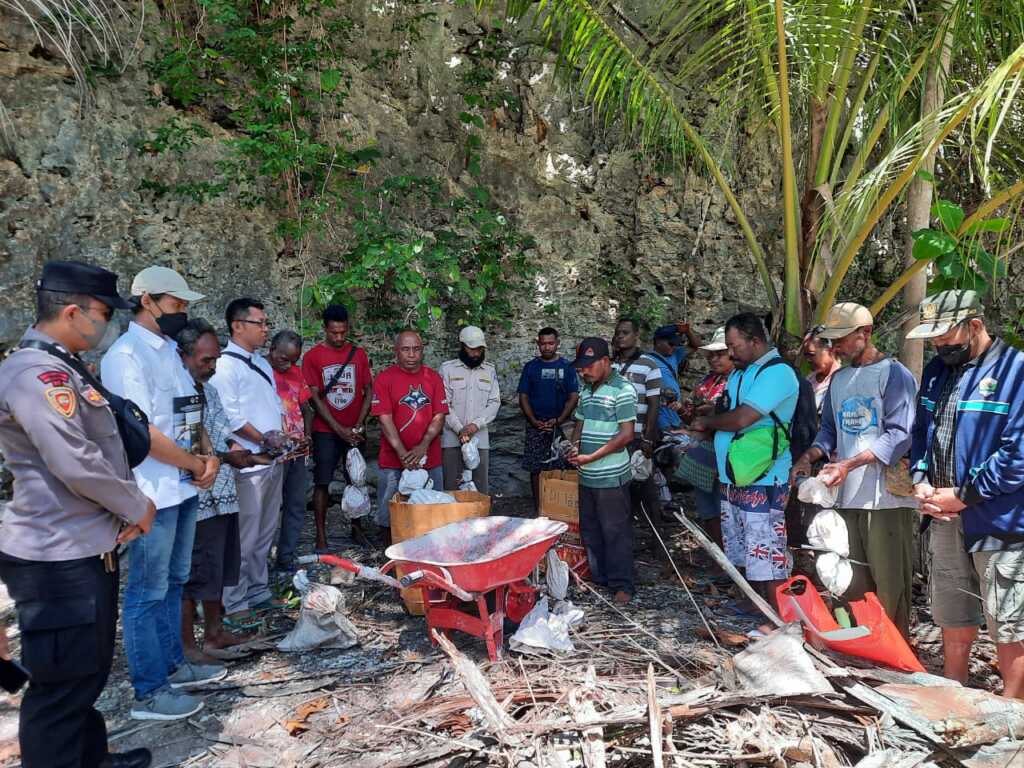
Representatives from the Office of Conservation of Natural Resources in West Papua and partners, along with village chiefs, customary figures, religious figure, and representatives from three Forest Farmers Group prayed together prior to releasing coconut crabs on Saturday, 23rd of October, 2021. (Photo by: Maikel Sada-CI Indonesia/2021)
Meidiarti Kasmidi also hope that the coconut crabs population’s preservation initiative will provide economic benefit for the local communities from tourism services provided, from tourist guides, boat rental, accommodation, to local souvenirs. “Of course it is not an instant process, it will need good cooperation with all members of the communities in Fam Islands.”
Subsequent to releasing coconut crabs in Meos Ambower, Office of Conservation of Natural Resources in West Papua and CI Indonesia continued the event that day with distributing coconut crab’s conservation poster for the three villages in Fam Islands. The poster’s distribution also emphasized the information regarding the potential of significantly higher economic value of a live coconut crab comparing to selling them illegally for consumption.
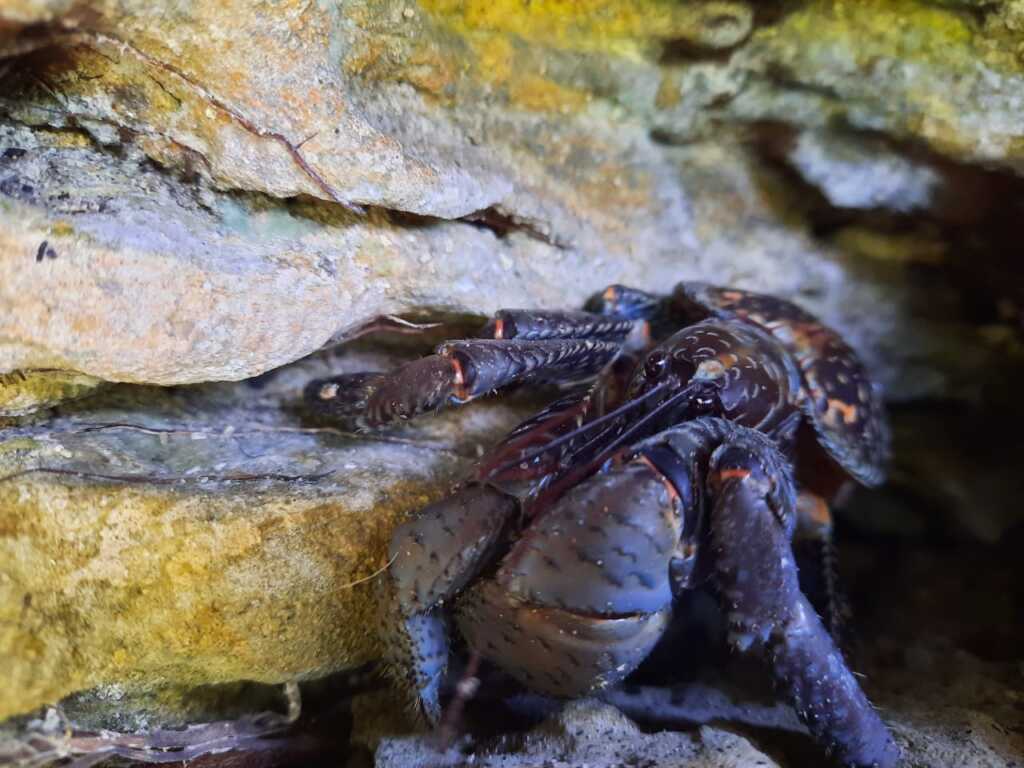
One of the adults coconut crab released in Meos Ambower, Fam Islands. (Photo by: Maikel Sada-CI Indonesia/2021)
* Mohamad Rizki Riadhi is the Office of Conservation of Natural Resources’ Forest Ecosystem Management
** Maikel Sada is the Raja Ampat’s Sustainable Development Officer for CI Indonesia
*** Nikka Gunadharma is the Raja Ampat’s Communication and Outreach Coordinator for CI Indonesia
**** West Papua’s Office of Conservation of Natural Resources (Balai Besar Konservasi Sumber Daya Alam Papua Barat or BBKSDA Papua Barat in Bahasa Indonesia), which nested under the Directorate General of Natural Resources and Ecosystem Conservation, is one of the Ministry of Environment and Forestry’s technical unit in West Papua. Within its core function, BBKSDA Papua Barat, is tasked to manage several conservation areas in West Papua Province, which consists of several types of conservation areas from Wildlife Reserve, Nature Preserve, Nature Park, to conservation on specific flora and fauna both within and outside conservation areas.
***** Raja Ampat Marine Park Authority is one of the technical implementation units nested under the West Papua Province Government’s Agency of Marine and Fisheries, and is authorized for management efforts towards six MPAs in Raja Ampat. Those six MPAs are: Asia and Ayau Islands MPA; Mayalibit Bay MPA; Dampier Strait MPA; Kofiau-Boo Islands MPA; Misool Islands MPA, and; Fam Islands MPA. Raja Ampat Marine Park Authority also provided technical assistance for Wayag’s Monitoring Post in West Waigeo Islands Marine Reserve.





































